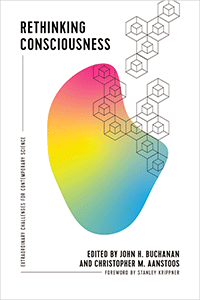John H. Buchanan and Christopher M. Aanstoos
with a Foreword by Stanley Kripper
Telepathy, clairvoyance, telekinesis—psi abilities consistently rejected by science despite widespread acceptance by the general public.
In ten chapters, contributed by leading parapsychologists and philosophers, These essays explore experiences that present significant challenges to the modern scientific worldview, in particular, to its insistent refusal to reconsider its underlying commitment to a materialistic, mechanistic, atheistic metaphysics. Philosophically, Alfred North Whitehead’s process view of experience is described as being more congenial not only to extraordinary experience, but to the current state of scientific research, which has revealed that activity, selection, and response are facets of every level of reality from the quantum event to the neural cell. Ironically, the only part of our world whose synthetic responsiveness—whose “subjectivity”—is regularly called into question by the academy is the human subject. And the primary reason for this most peculiar situation is modern science and philosophy’s largely unconscious metaphysical allegiance to one-half of an abandoned Cartesian dualism, which in practice is no longer accepted by any scientific discipline. Nonetheless, try to assert some idea that does not cohere with this assumed notion of reality and prepare to be informed it is “impossible,” while at the same time being told that this response is not related to any preexisting metaphysical sentiments.
The area of scientific research that challenges the modern paradigm most head-on is parapsychology, which has for decades churned out careful study after study supporting the existence of extrasensory perception, especially telepathy, clairvoyance, and psychokinesis. The reasons why this research has been doubted, challenged, and sometimes vilified are several, but underlying all of them are certain philosophical and, surprisingly, theological choices made about the nature of reality during the formative period of the scientific endeavor. Descartes’ mind/matter metaphysics on the philosophical side, and the denial of action at a distance—partly in order to preserve the unique quality of Christian miracles—on the religious side, still haunt the foundations of modern science, even though “mind” (and God) have been exorcised, while action at a distance remains a shrouded constant in scientific theory (e.g., gravity and electromagnetic attraction).
Transpersonal psychology, which studies all types of extraordinary experience—mystical, psychedelic, near-death, out-of-body, and psychical—presents an even greater challenge to the modern paradigm’s materialist-mechanical worldview: the notion that the universe is composed solely of bits of inert, insentient matter in motion.
But it is important not to oversimplify the reasons for the widespread suspicion of psychical “powers,” especially in academic circles. If they exist, why don’t we see them regularly in action? Or if only certain people are significantly endowed with these abilities, why aren’t theyat least able to provide clear-cut demonstrations of their existence? Beyond these valid questions, there is the more complex issue of howtelepathy or psychokinesis might operate, that is, what is a possible explanatory mechanism for how they function? The essays in this volume provide coherent answers to these excellent questions by offering important new ways of looking at the nature of reality and the basic structure of the universe.
Whitehead’s metaphysical vision is especially important and useful because of his wide-ranging expertise in mathematics, logic, physics, history of ideas, and the philosophies of science, nature, and religion. Particularly important here is Whitehead’s incorporation of both quantum theory and relativity into his mature philosophical synthesis. Thus his efforts to “fuse” religion and science within one encompassing vision of the nature of reality and the universe is one that still holds import for us today and is uniquely suited to addressing the issues raised by parapsychological research and the findings of transpersonal psychology.
- Series: Toward Ecological Civilization
- Paperback: 248 pages
- Price: $20.00
- ISBN-13: 978-1940447438
- E-book: $9.99
Table of Contents
Foreword, Stanley Krippner
Introduction, John H. Buchanan and Christopher M. Aastoos
- Denigration of the Subject in Late Modern Thought, John B. Cobb, Jr.
- Parapsychology and Whiteheadian Panexperientialism, David Ray Griffin
- Parapsychology, John Palmer
- Parapsychology Needs a Theory—And It Has One, James Carpenter
- First Sight: A Whiteheadian Perspective, John H. Buchanan
- Revision and Re-enchantment of Psychology, Stanislav Grof
- Amplified Subject, Leonard Gibson
- David Ray Griffin on Steiner and Whitehead, Robert McDermott
- A Phenomenology of the Ecological Self, Christopher M. Aanstoos
- 10. All Tangled Up: Life in a Quantum World, Larry Dossey
Ways to purchase:
Request Exam Copy Request Review Copy





